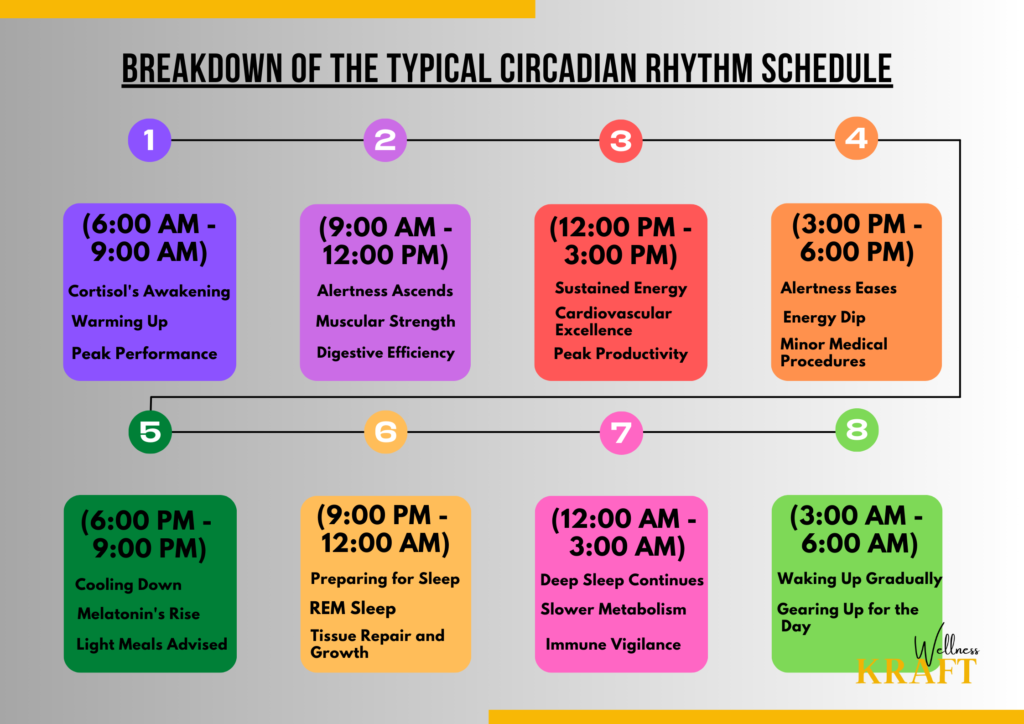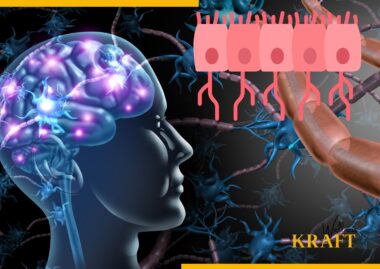“In the heart of circadian rhythm lies the secret to a well-rested soul and a peaceful mind.” – Wellness Kraft
Table of Contents
Introduction
The concept of the circadian rhythm has become increasingly fundamental to the fields of research and medicine. This complex biological process is crucial in regulating many aspects of our lives, including our sleep-wake cycles and general health. In this in-depth article, we explore the mechanisms, discuss the effects on human health, and offer suggestions for improving your own circadian rhythm.
Understanding the Circadian Rhythm
Circadian rhythm, sometimes known as the “biological clock,” controls our sleeping and waking schedules, among other bodily processes. The majority of living species, including humans, experience this extraordinary 24-hour cycle in response to external stimuli, primarily light and darkness.
The Science Behind It

A small group of neurons in the hypothalamus, called the suprachiasmatic nucleus (SCN), is responsible for maintaining the body’s 24-hour clock. The SCN is the master clock of the body, coordinating the secretion of hormones like melatonin, which is essential for proper sleep regulation, in response to environmental light.
Circadian Rhythm’s Impact on Mental Health
Our body’s internal clock, known as the circadian rhythm, is crucial in controlling a number of physiological functions, such as hormone synthesis and sleep-wake cycles. Its effects on mental health are just as significant as its well-established effects on physical health. Let’s examine the impact of circadian rhythm on mental health.
1. Sleep Habits and Emotion
Sleep patterns are the most obvious way that circadian rhythm and mental health are related. Our internal clocks tend to function better, and we get more rejuvenating sleep when they are in line with our circadian rhythm. Consequently, our mood and emotional health benefit from this. Sleeping on a regular and high-quality basis is believed to lower the risk of mood disorders like anxiety and sadness.
On the other hand, shift work or inconsistent sleep patterns are common causes of circadian rhythm disorders, which can lead to sleep disturbances. Poor or insufficient sleep is a known risk factor for a number of mental health issues. It can sometimes even cause mental health conditions, or at least make their symptoms worse.
2. Stress Reactions and Hormones
The body secretes a number of chemicals, including cortisol, which is the main stress hormone, in response to the circadian cycle. Cortisol has a regular daily schedule; it usually peaks in the morning to aid in waking and then steadily decreases during the day.
An imbalance in our circadian rhythm can result in abnormal cortisol levels. As a result, people may have a modified stress response, increasing their susceptibility to stress and decreasing their ability to successfully manage it. Anxiety and mood disorders, among other mental health conditions, are strongly associated with long-term stress.
3. Productivity and Cognitive Function
Circadian rhythm has an equal impact on productivity and cognitive performance. When our daily activities and our biological clock are in sync, we are more likely to be focused and attentive during the day. This synchronization maximizes our capacity for cognitive function and decision-making.
On the other hand, circadian rhythm disturbances can result in cognitive impairment, which includes issues with memory, focus, and problem-solving. These cognitive difficulties may be a factor in mental health issues like elevated stress and low self-esteem.
4. SAD, or seasonal affective disorder
Depression that has a seasonal rhythm is known as seasonal affective disorder, or SAD. It usually manifests itself in the fall and winter, when there are fewer daylight hours. Since less exposure to natural light might throw off the body’s internal clock, SAD is thought to be associated with disruptions in the circadian cycle.
Symptoms of SAD include decreased energy, emotional fluctuations, and changes in appetite in individuals. Treating this illness with light therapy, which tries to reset the circadian cycle, is frequent.
The Impact on Human Health
- Quality and quantity of sleep
The circadian rhythm is a major factor in how much and how well we sleep. When our internal clock is in harmony with our sleep schedule, we get the deep, rejuvenating sleep that allows us to start the day feeling rejuvenated.
2. Mood and Emotional Stability
Negative emotional and psychological impacts have been linked to disruptions in the body’s natural 24-hour sleep-wake cycle. Mood disorders like depression and anxiety have been linked to disruptions in sleep and waking cycles.
3. The Regulation of Metabolism and Body Weight
The circadian clock has been linked to a higher metabolic rate, according to studies. Obesity and weight gain can occur when our internal clock is thrown off, leading to improper eating habits and hormonal imbalances.
Our circadian rhythms also have an impact on the condition of our hearts. The risk of cardiovascular illnesses, high blood pressure, and other problems increases when this rhythm is disturbed.
Breakdown of the Typical Circadian Rhythm Schedule

The circadian rhythm, or biological clock, follows a detailed schedule that regulates various physiological processes over a 24-hour cycle. Here is a breakdown of the typical circadian rhythm schedule:
Morning (6:00 AM – 9:00 AM):
- Cortisol levels start to rise, helping you wake up and feel alert.
- Body temperature begins to increase, promoting alertness and metabolic activity.
- Cognitive function and physical performance tend to peak during this time.
Mid-Morning (9:00 AM – 12:00 PM):
- Alertness and focus continue to improve.
- Muscular strength and coordination reach their zenith.
- Digestive system becomes more active, promoting efficient nutrient absorption.
Afternoon (12:00 PM – 3:00 PM):
- Body temperature remains high, and energy levels remain stable.
- The heart and cardiovascular system function at their best.
- This is the optimal time for physical activity and productivity.
Mid-Afternoon (3:00 PM – 6:00 PM):
- Alertness and cognitive function start to decline slightly.
- A mild drop in body temperature can lead to a slight energy dip.
- The body’s response to pain is at its lowest, making it an excellent time for minor medical procedures.
Evening (6:00 PM – 9:00 PM):
- Body temperature begins to drop.
- Melatonin production increases, signaling the body that it’s time to prepare for sleep.
- Digestive system starts to slow down, making heavy meals less advisable.
Night (9:00 PM – 12:00 AM):
- The body prepares for the initial stages of sleep.
- Core body temperature reaches its lowest point.
- Rapid eye movement (REM) sleep begins, associated with vivid dreams.
Midnight (12:00 AM – 3:00 AM):
- The body remains in deep sleep, focusing on tissue repair and growth.
- Metabolic processes continue at a slower pace.
- Immune system activity peaks, providing defense against infections.
Early Morning (3:00 AM – 6:00 AM):
- Body temperature starts to rise gradually.
- The body prepares to wake up and become alert.
- A period of lighter sleep often occurs in preparation for waking.
It’s essential to note that individual circadian rhythms can vary, with some people being “morning people” and others “night owls.” External factors like work schedules, lifestyle choices, and exposure to artificial light can also influence the circadian rhythm’s schedule. Maintaining a consistent sleep-wake routine and aligning daily activities with your natural circadian rhythm can help optimize overall health and well-being.
How to Achieve Optimal Circadian Rhythm
1. Keep to a Regular Bedtime
Consistently adhering to a bedtime and wake time can aid in resetting your circadian cycle. Keep your routine as regular as possible, including on the weekends.
2. Get some natural light
Time spent outside in natural light during the day can assist set the circadian rhythm. Every day, spend at least 30 minutes in natural light.
3. Reduce Your Nighttime Exposure to Artificial Light
Screens’ blue light is known to mess with people’s internal body clocks. Reduce your screen time in the hours right before bed, or use a blue light filter on your device, if possible.
4. Don’t eat a big meal right before bedtime
Eating a big, heavy dinner right before bed can keep you up. If you’re hungry before bed, choose something light that won’t keep you up too long to digest.
5. Establish a Calming Nighttime Ritual
Try reading a book, having a warm bath, or doing some relaxation exercises to help you wind down before bed. Doing so may help your body understand that it’s time to relax.
The Road to Better Health
Your health and well-being can greatly benefit from your efforts to decipher and enhance your circadian rhythm. You can keep your body running at peak performance all the time by accepting the science underlying this biological clock and making some easy tweaks to your daily routine.
There is a significant influence of the circadian rhythm on mental health. Its impact on hormone control, sleep patterns, stress response, cognitive performance, and the emergence of disorders such as SAD emphasizes how crucial it is to preserve a healthy internal clock. Understanding the relationship between circadian rhythm and mental health can help develop preventative and therapeutic approaches for mental health conditions. Regular sleep schedules, time spent in natural light, and a well-balanced daily schedule can all help to enhance mental health and the general quality of life.
FAQs
1. What is the circadian rhythm?
It is your body’s internal clock, regulating essential processes, including your sleep-wake cycle, based on a 24-hour cycle.
2. How does the circadian rhythm work?
The suprachiasmatic nucleus (SCN) in the brain responds to light cues, controlling the release of hormones like melatonin, which influence our sleep patterns.
3. Why is circadian rhythm important for health?
Maintaining a healthy rhythm is crucial for quality sleep, mood stability, metabolism, and overall well-being.
4. What disrupts the circadian rhythm?
Artificial light exposure, irregular sleep patterns, and night-shift work.
5. Can I reset my circadian rhythm?
Yes, you can reset it by maintaining a consistent sleep schedule, limiting artificial light exposure at night, and practicing good sleep hygiene.
6. Does the circadian rhythm change with age?
Yes, it tends to shift with age, leading to earlier bedtimes and wake-up times for older adults.
7. How can I optimize my circadian rhythm for better sleep?
Optimize by sticking to a consistent sleep schedule, getting exposure to natural light, and avoiding heavy meals before bedtime.
8. What is the connection between circadian rhythm and mental health?
Disruptions in it can contribute to mood disorders such as depression and anxiety.
9. Can irregular work hours affect the circadian rhythm?
Yes, irregular work hours, like night-shift work, can disrupt, leading to health issues.
10. Can circadian rhythm affect weight and metabolism?
An irregular circadian rhythm can lead to weight gain and metabolic issues, as it disrupts eating patterns and hormone regulation.
Concluding Thought
Understanding and optimizing your circadian rhythm is essential for maintaining good health and well-being. By following the recommended practices and making necessary lifestyle adjustments, you can ensure your body functions at its best.










